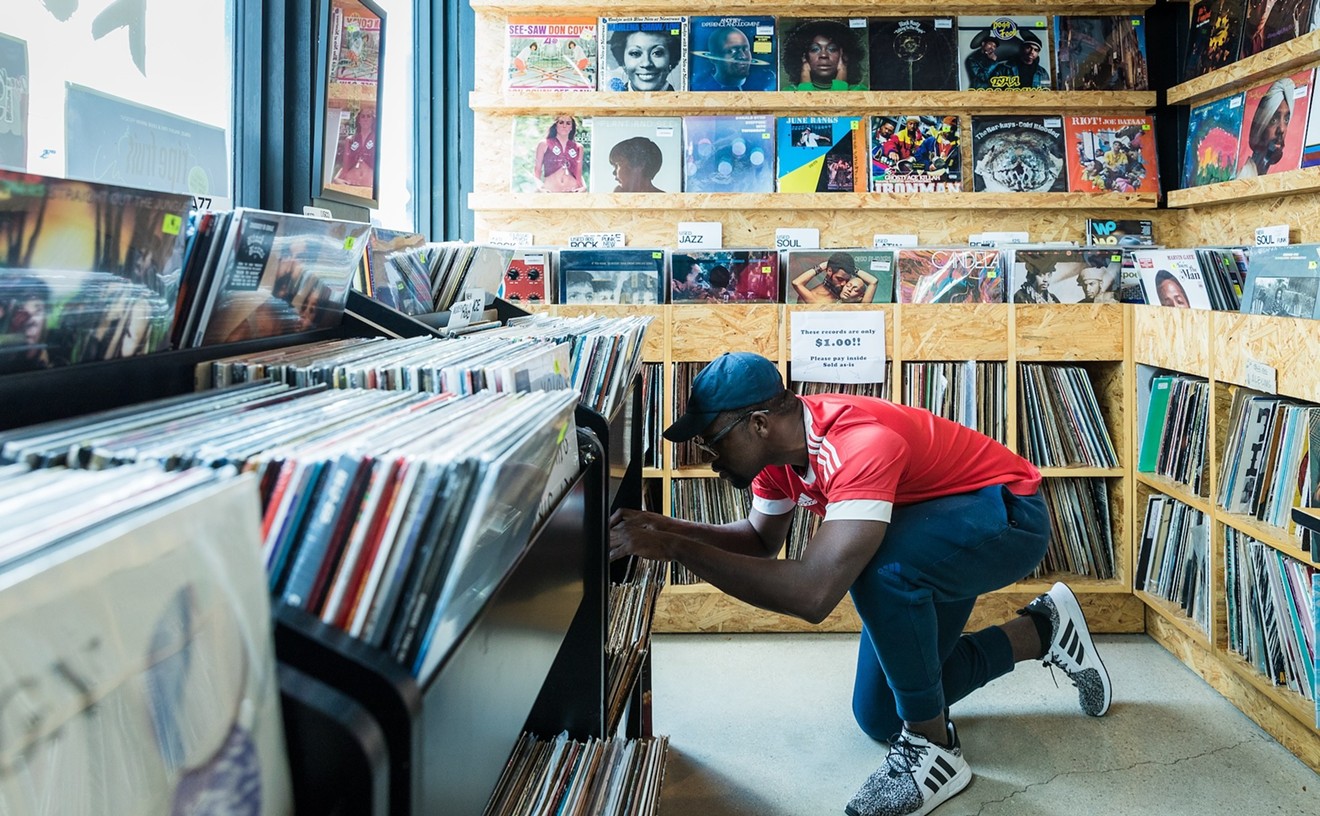The Latin Grammy recently awarded for her 2000 release, Siempre Viviré, only confirms Cruz's lengthy reign as La Guarachera del Mundo, ruler of the dance world. So intent are the 300 subjects circulating through the cocktail party that Dominican salsero José Alberto ("El Canario") and Cuban timbero Manolín ("The Salsa Doctor") pass practically unnoticed. Sony marketing director Edith Vasquez tries to calm the restless press: "The interviews with Celia are going to be on the terrace, okay?"
The Salsa Queen's latest CD, La Negra Tiene Tumbao, is her 79th release. Produced in New York by tropical hitmaker Sergio George, with Isidro Infante and long-time Cruz collaborator Johnny Pacheco, The Black Woman's Got Swing is probably her freshest offering in recent years. Guest rapper Mike Perfecto gives the title track a modern touch, while the classic arrangements of Pacheco hark back to Cruz's earliest hits. "One of the things that makes me happy is that I made sure all the songs were original," La Guarachera says of the ten new tracks.
Only ten? "I just wanted to do ten, chica, and no more," she laughs, shaking her wig. "Sing, sing, sing, and then they only promote four [songs]. Why kill myself singing so much if later on I have to kill myself again promoting?" That may be experience talking, but the years have not slowed down the woman who parades across the world's stages on precarious heels in Technicolor wigs and sequined dresses, still belting out her sugary slogan: "Azuuuucarrrrrr!"
Following up on her recent hit, "La Vida Es un Carnaval" ("Life Is a Carnival"), La Negra's first single, "Hay Que Empezar Otra Vez" ("We Have to Start Over"), was entrusted to the same team: Argentine songwriter Victor Daniel and Nuyorican producer Infante. If it's true that the legendary singer has managed to keep ringing in everyone's ears all these years with the classics "Bemba Colora," "La Guagua" ("The Bus"), and "Quimbara," it seems that now she has found in the Daniel-Infante pair the classic Nuyorican style that permits her to stay on the airwaves with her newest undertakings, sometimes less Cuban or less folkloric than her earlier hits.
Nevertheless Johnny Pacheco, the legendary cofounder of the Fania All-Stars, put his mark on two of the tunes. The conjunto ensemble of the Fifties and Sixties that catapulted Cruz to stardom with Sonora Matancera and did the same for Pacheco with his own orchestra, Pacheco y Su Tumbao, resurges on this new CD, proof that while she is a modern woman, she has not abandoned her old-time swing. Pacheco's arrangements are dominated by the traditional Cuban sound of the tres, brass, and fusion of congas with bongo. La Negra has contemporary island swing as well, as heard in "Taita Bilongo," a composition by Alain Perez, the bass player exiled in Spain who was once the director of Issac Delgado's orchestra.
Propelled by Cuban Time past and present, Cruz's familiar voice dresses each note in undeniable cubaneo, demonstrating 100 percent that she is not just the Salsa Queen but also La Guarachera del Mundo.
The legend is quick to remind reporters of salsa's Cuban origin. "Salsa doesn't exist as a genre; it's simply a commercial name," she clarifies in an interview weeks before the party. "The first time I heard someone talking about salsa was Venezuelan announcer Phidias Danilo Escalona, who invited me to his show, La Hora de la Salsa (The Salsa Hour). His salsa hour was [filled] with the music of [Cuban acts] Sonora Matancera, Celia Cruz, Bienvenido Granda, Celio Gonzales. He was the first to promote this name for our music."
Salsa may have originated in son, but Cruz, as it turns out, got her start singing tango. "The first time I sang in an amateur program was in Radio Garcia Ferra [in Havana]," she recalls. "I brought the claves, and pianist Gerardo Pedroso asked me: “Which song are you going to sing?' I said: “Nostalgia.'" Cruz's version of the popular tango written by Argentines Juan Carlos Cobian and Enrique Cadicamo won first prize in that early island version of Star Search. "From there I went everywhere," she recalls.
More than half a century later, the stage at Miami's Nostalgia awaits her. A video made in Mexico City by exile producer Ernesto Fundora heightens the anticipation, filling the noisy café with the chorus of the title track: "La negra tiene tumbao/Y no camina de lao" ("The black woman has swing/And it does not stagger"). By the time Cruz herself crosses the floor, the mob piles up like ants on sugar, and vaya, what sugar!
In a short speech, Cruz gives the requisite thanks, but the audience would rather have heard her sing the new single. After Cruz's comments draw to a close, publicist Vasquez reproaches anxious reporters hovering around the star: "Gentlemen, you can wait at the terrace because Celia is going directly there to give interviews."
The queen, however, cannot escape her subjects; fans trapped Cruz a few feet away from the stage. Her manager stood by, amazed: "They go crazy; they don't even let her walk." Those standing politely on the patio waited in vain. The queen had left the building. Knocked out by her tumbao (and maybe a few mojitos), the celebrants of Cuban Time staggered out, walking de medio lao.










